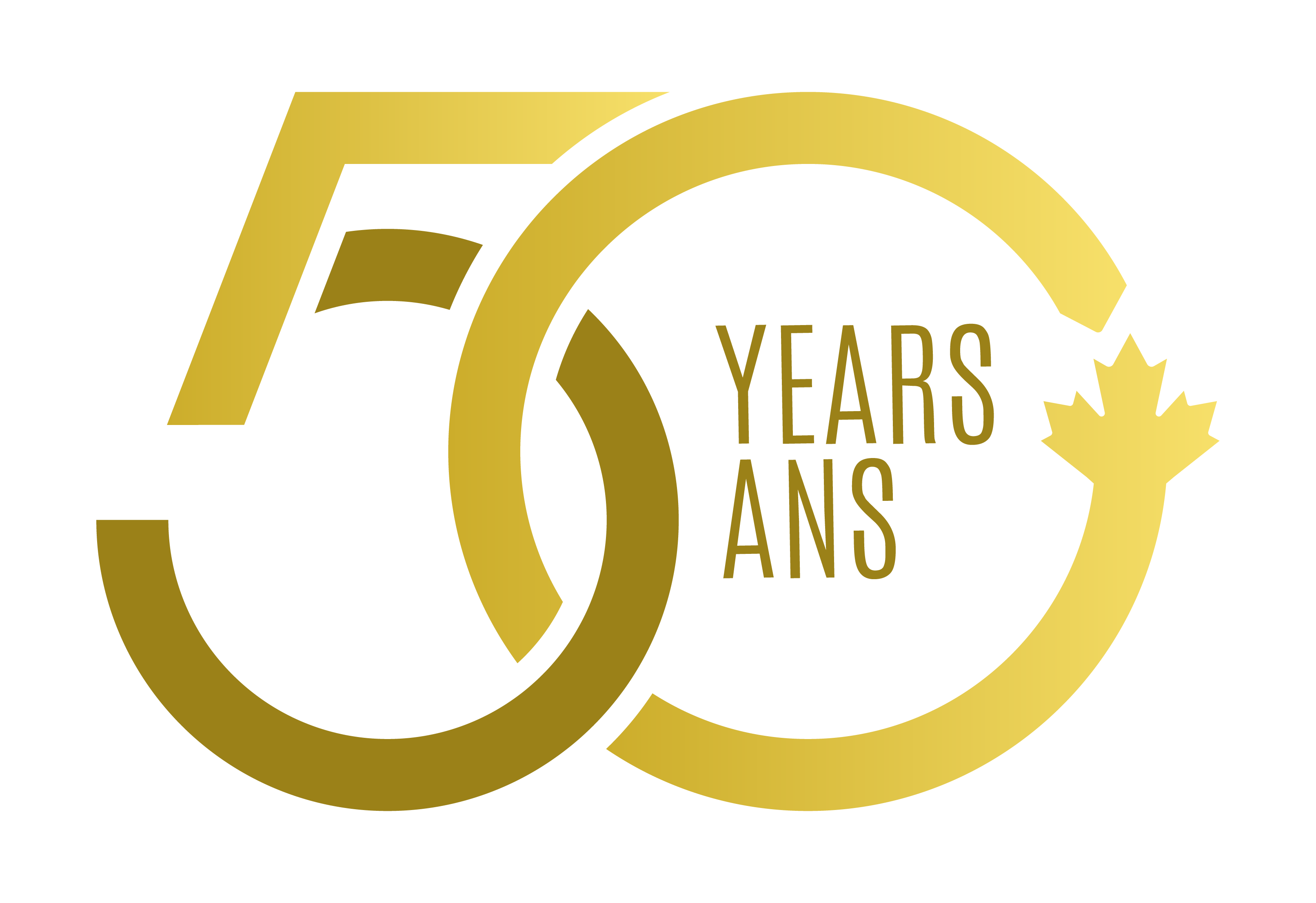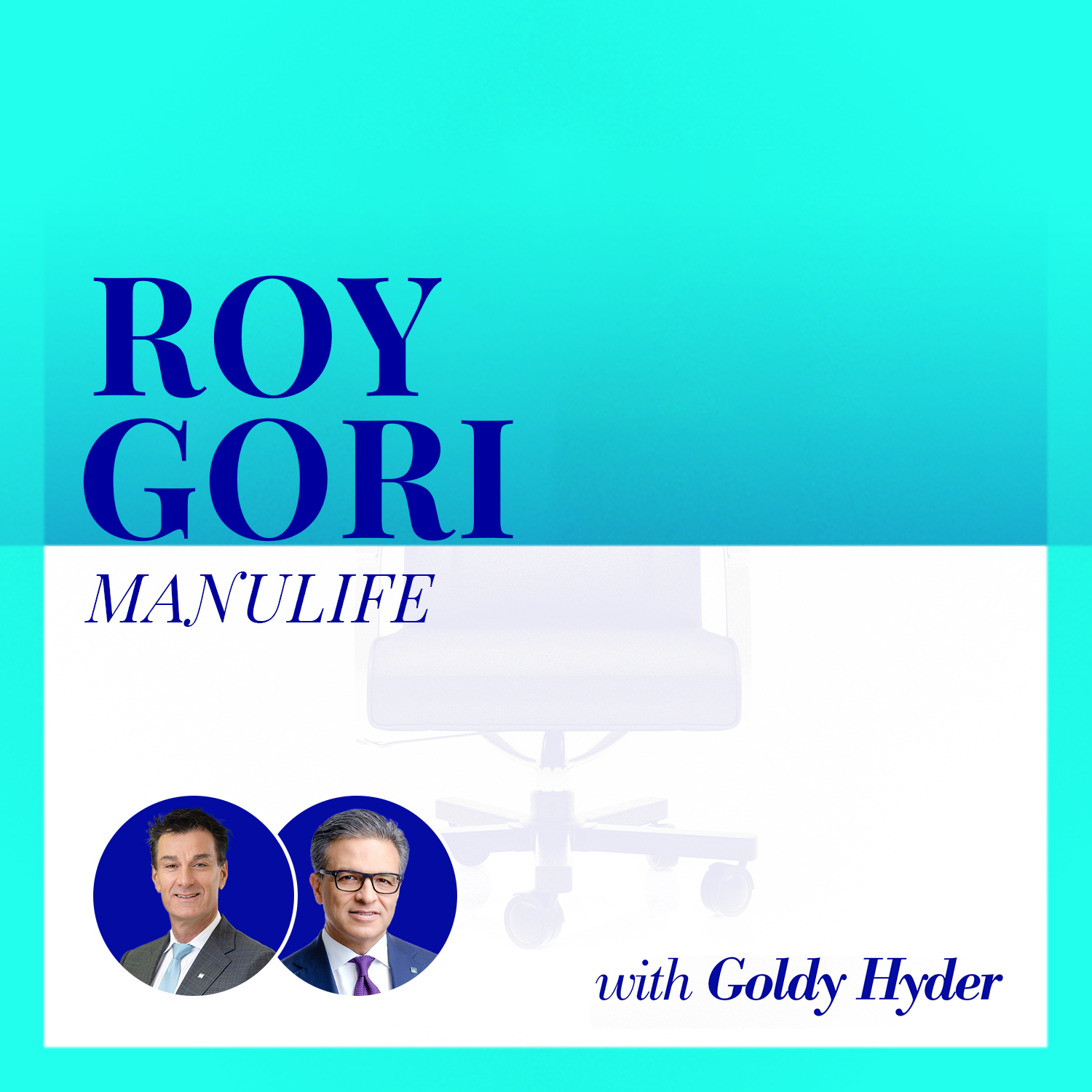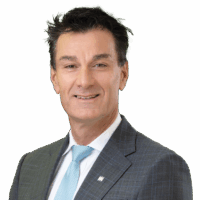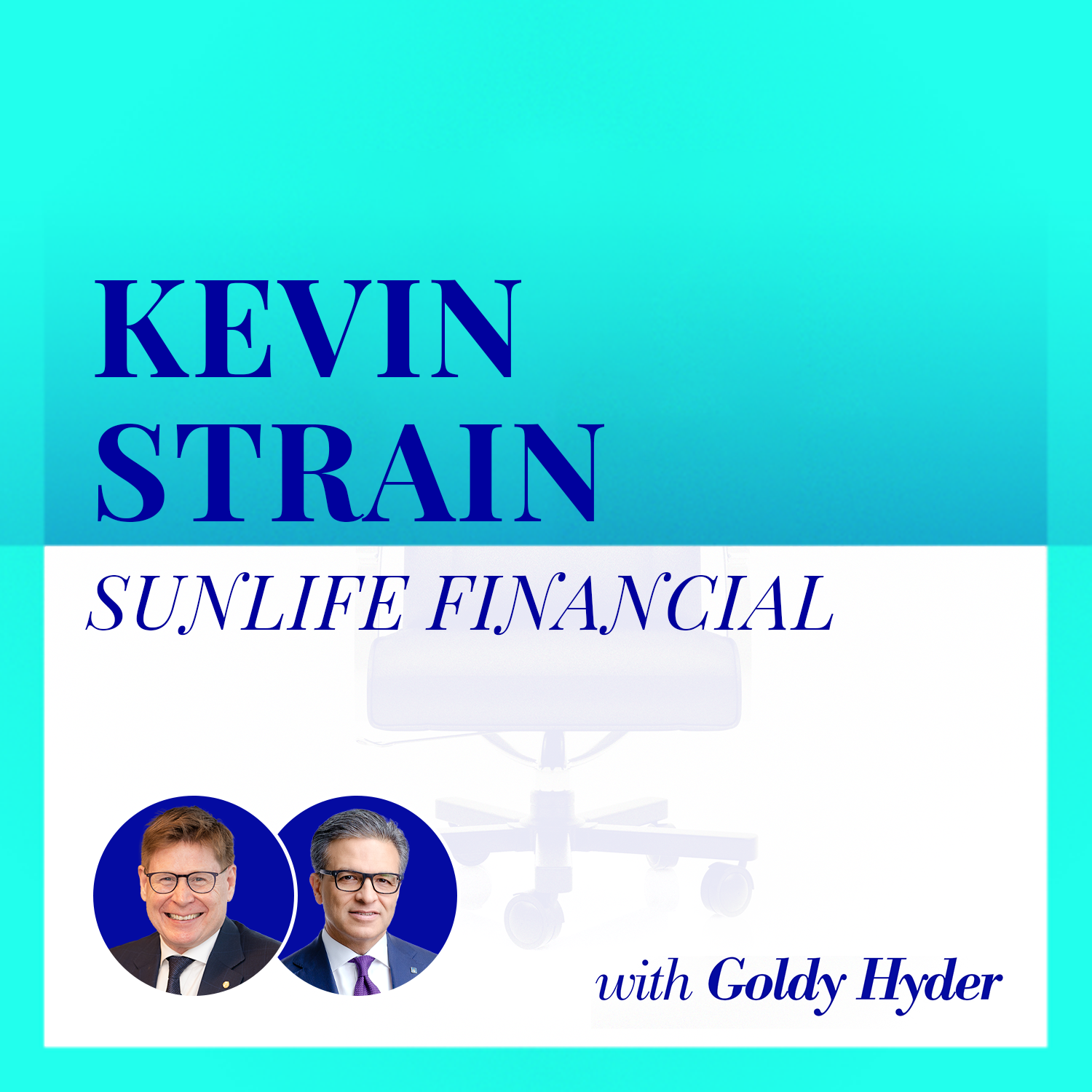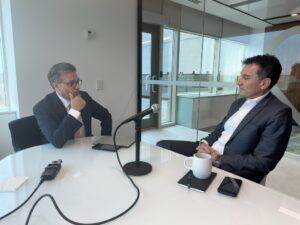
Roy Gori started his first job – a paper route – at age eight. At ten, he was delivering medications to seniors for a local pharmacy. He got a job with Citibank straight out of high school at 17 and has been working full time ever since. So it’s perhaps not surprising that, at age 56, he’s decided to try something new.
In early May, he retired as President and CEO of Manulife after eight years leading the international financial services group. The Canadian company has a massive global footprint, employing 40 thousand people around the world.
Before leaving his post, Gori sat down with Goldy Hyder to reflect on his career and talk about what comes next.
“It has been the honour and privilege of my life to lead this great Canadian organization,” he says on the Speaking of Business podcast. “Never would I have imagined that the son of a coal miner could become the CEO … and I’ve never taken that responsibility lightly.”
In the wide-ranging conversation, Gori discusses his work ethic, lessons he’s learned through adversity, transformational changes at Manulife, and Canada’s global reputation.
Listen to the full interview, including how Gori ended up intercepting a pass from quarterback Tom Brady, on the Speaking of Business podcast.
Roy Gori:
“We’re all going to have adversity in our career. What differentiates good leaders from average leaders are those that are able to embrace adversity and overcome it.”
Goldy Hyder:
Welcome to Speaking of Business. Conversations with innovators, entrepreneurs, and Leaders. I’m Goldy Hyder, president and CEO of the Business Council of Canada. Today I’m in downtown Toronto at the headquarters of Manulife. What a great Canadian success story. The financial services provider has a huge international footprint as a Canadian champion. It employs 40,000 people and services 36 million customers around the world, all based right here in Canada. Since 2018, the company has been ably led by president and CEO Roy Gori, but in early May, Roy is retiring.
I can’t let him go without speaking with him about his career, the lessons he’s learned, and what comes next. Welcome to the podcast, Roy.
Roy Gori:
It’s great to be with you, Goldy.
Goldy Hyder:
All right, well let’s start where I just said, you’re retiring, but are you really retiring? What comes next?
Roy Gori:
Retirement sounds so fatalistic and you have these visions of someone sitting on a beach and reading books. That’s not my version or view of what retirement’s going to look like, but obviously I’m really proud of what we’ve achieved with Manulife over the eight years that I’ve been CEO and 10 years that I’ve been with the company and I’m sure we’ll get into that in some detail. I’m really looking forward to the next chapter and the next chapter for me is going to be about spending much more time with the family, obviously also doing much more philanthropically. I feel like I’m incredibly fortunate to being dealt the cards that I’ve been dealt and the situation that I’m in is going to allow me to give back to those that are less fortunate. So philanthropy is going to be a big part of the agenda. I’m deeply passionate about health, longevity, wellness. I think too much of society’s healthcare system is geared towards dealing with illness management rather than prevention. So I want to be investing in startups that are doing some phenomenal things in that space and mentoring leaders, entrepreneurs of the future. So those are some of the things that I’m focused on, but to be frank, I think part of the fun’s going to be in exploring what that next chapter looks like and evolving that through time.
Goldy Hyder:
Well look, you’ve done great here. I’m sure you’ll do great with what you’re talking about. A lot of passion. I’m going to come back to those issues, but you mentioned family. They are getting their Canadian citizenship right here as are you.
Roy Gori:
Indeed.
Goldy Hyder:
Why?
Roy Gori:
Well, we love Canada and I think now we sort of see ourselves more as Canadian, quite frankly, than any other nationality. We’re proud of our Australian roots, but we’ve spent a large part of our life now and especially the kids have spent most of their formative years here in Canada, and we just think Canada’s an amazing place. We believe that the value system that exists here is certainly aligned to our value system. We think the country has so much opportunity and we want to be part of that. So yes, we’ve applied for citizenship. Sarah, my wife actually was at the offices doing her ceremony and allegiance yesterday.
So she was, I think deemed to be the most Canadian eligible of all the Goris and she was approved first. I’m not sure when I’m going to get approved, if I get approved, maybe I won’t qualify, but no, we’re really proud of this and this is a real big milestone for us.
Goldy Hyder:
Well that’s great. Welcome to Canada, officially.
Roy Gori:
Thank you.
Goldy Hyder:
Let’s talk about the early years of your life. It’s one saying, someone said that your personality formed by the time you’re like seven in some cases. I was reading up about your childhood and early life, and yes, you had a very early usual paper route kind of job, but the job that struck me was when you were 10, you were delivering medicines to seniors. Tell me more about what you remember about that time. And I ask because what I know of you tells me that a lot of that shaped you.
Roy Gori:
Very much so. I was born into migrant parents. My parents were Italian. They migrated to Australia after the war and they migrated because quite frankly there was no employment and they had to leave Italy to find employment to actually support their families. Dad was a coal miner and in fact he stopped his schooling at the age of eight. Mum stopped at nine. So they weren’t deeply educated, but they believed in hard work. And that was something that was instilled in me very early. I remember my dad speaking to me when I was very young and he said, “You won’t be the smartest kid in the room, no offense, and you are not going to be the wealthiest either, but you can be the hardest working and that’s a decision that you can make.”
And I really took that to heart and I said, “That’s what I’m going to be. I’m going to be the most tenacious, I’m going to be the hardest working. If everyone else needs to spend five hours to get a 90 in an exam, I’ll spend eight.” And the same philosophy has sort of really been the way I’ve thought about my life and it’s been my superpower as I’m going to work harder than anyone else and I’m going to be more tenacious. When there are obstacles, I’m going to overcome them. Part of that was that upbringing and certainly the messages from mum and dad, but I also did many jobs as you alluded to early on, and whether it was a paper route or working in a fruit shop, working delivering pharmaceuticals was another thing that I did very early at the age of 10.
And there actually I learned a lot of lessons. Each of these opportunities, as you say, are opportunities to learn and to develop and grow, but I was getting paid $4.50 an hour and I would deliver pharmaceuticals to the elderly and they typically needed those deliveries because they weren’t mobile and couldn’t get out of the house. So for many of them I learned this was a huge highlight of their week getting this pharmaceutical delivery. And I didn’t know that at the time that that could be something that important that I was doing. But I sort of learned that, “Hey, if I put a bit of time and attention into this interaction, then it actually translated into tips.”
And that often was sort of, “Hey, come on, would you like to come in and have a biscuit and a cup of tea?” I don’t know whether I’d be that happy with my kids doing that right now, but I would oblige and it would end up being a 20-minute conversation and I would end up getting a $5 tip or a $10 tip, so it was equivalent of an hour or two of work. And at first it sounded like a good equation, but then I learned these people have got some incredible stories and I would learn about their stories in life. And from that, I developed a curiosity and also this knowledge that when you’re with people you’ve got to be present.
And if you’re present and if you’re in the moment, it makes a big difference to them and to you. So that was certainly one of the lessons I learned very early on, and it’s something that I’ve tried to instill in the way I live my life.
Goldy Hyder:
It’s so important in today’s sort of superficial world too.
Roy Gori:
Very much so. And again, I just look back at every experience and sometimes it’s the hardships that actually have a bigger imprint in your life than the great times.
Goldy Hyder:
Let’s pick up on that. Tell me more. Do you remember a failure or two that kind of said, “Wow, and life’s over,” but you learn from it?
Roy Gori:
Right, so I mean lots of failures, more than my fair share of failures, and I’ve always looked at those failures or issues as learning opportunities. I started working straight out of high school when I was 17 years old, which isn’t the typical route that anyone would take in life. Again, I did my three-month summer internship and it was for this little known organization for me in Australia, which was Citibank. They just got a license to operate in Australia and they needed employees. I literally was hired into the mail room. And at the age of 17, after doing an internship for three months, they said, “Look, we think you’ve got some potential. Would you like to stay working full time and then go to university at night?” So I did my undergrad that way, and then I did my post-grad, I did my MBA part-time as well. So I’ve been working for a long time. Many people look at me and say, “Geez, you’re 56, you’re retiring.” But I’ve been working since 17, so it’s been quite some time. But on lessons and hardships, I remember early on I was on this track where I was being promoted, moved into new areas, and rotated across different functions and departments. And through that time we had a rating system, not dissimilar to what most companies have, and that is a one through five system.
One is your top performer, probably in the top five or 10 per cent of the population of people. Five, you need to look for another job. And obviously there’s everything else in between. And I remember that after four years through mid-years and end of year assessments, I was rated a one consistently every time. Very proud of this. In fact, almost branded myself “A1.” And then I went and rotated into another area and the manager did a half year review with me and he rated me a three. I never forget that. That was devastating for me. How can I be average? Three was average. “How could I be average? I’ve been such a high performer and this is a real kick in the teeth.”
And I remember leaving that meeting deflated, angry, frustrated, and I called a prior boss who became a mentor of mine and said, “I need to talk to you. I’m really frustrated.” He said, “Sure, let’s catch up for breakfast tomorrow.” I caught up with him for breakfast and he said, “What’s up?” And I said, “Well, I’ve just had my mid-year review with this new manager and can you believe it? He’s rated me a three, I’m a one, and this guy’s got no idea. What do you think?” And he says, “Well, what are you going to do?” And I said, “I think I need to quit. There’s no way I can keep working here.” And his response to me was, You’re probably right. I think you should quit.”
And I said, “Hang on a sec. That isn’t the way this conversation was supposed to go…”
Goldy Hyder:
You’re supposed to convince me.
Roy Gori:
You’re supposed to tell me I’m fantastic. This guy’s an idiot. Just see it through. You’ll be working in it for another boss soon. But instead he said, “Actually, I thought you were pretty good, but if this is how you respond to the first sign of adversity, you’re not as good as I actually thought you were. You probably should quit.” So I went home that night even more furious, but then when I sort of thought it through a little bit more, I thought, “Maybe there’s a lesson here.” And then I again reached out to that mentor and said, “Look, can you meet with me again?” He said, “No problem.” We did coffee the next morning and he said, “What’s up?”
And I said, “Well, I’ve been thinking about what you said and what do you think I should do?” He said, “Well, that’s a good question. Now you’re talking.” He said,” What I would do if I was you and what I think you should do is you should go and ask him why you’re a three. What can you learn from it? What is he seeing? Maybe he’s seeing things that others haven’t seen. Maybe he’s got the courage to tell you things that others didn’t have the courage to tell you and then do everything in your power to turn him around and show him that you are every bit as good as you think you are and we all think you are.”
From that moment I realized, “You know what? I’ve got to be able to handle adversity and stop being a victim and thinking that everyone else is at fault and start with myself. Whenever something goes wrong, look to myself first before looking to others.” It was a real big learning for me. And again, I think it’s shaped the way I’ve led both in terms of giving feedback to others in a way that the mentor was gifting me feedback, but also trying to think through the adversity is going to be there. We’re all going to have adversity in our career. What differentiates good leaders from average leaders are those that are able to embrace adversity and overcome it.
Goldy Hyder:
Thank you for sharing that. Part of the podcast that gets the most kind of reaction is what we just went through, to realize that failure is normal and embrace it and what to take from it. You also mentioned your dad as a coal miner. We’re living in an arena now where it’s almost like populism is wedging businesses from workers. You’ve seen both. How are we going to bridge this divide in your opinion?
Roy Gori:
I think you’re absolutely right, Goldy. I think we’ve now moved into a much more polarized world. We’ve got polarized views on any particular topic, and I think that’s largely exaggerated by social media, where we’re in our own echo chambers and we have certain views and perspectives, but then we have them amplified to us through various news sources and I guess influencers. And I think that’s a big problem because I think we end up looking for focusing on where there are differences as opposed to where there’s common ground. And I think that’s a problem for society and it’s certainly a problem for the political sphere that we’re operating in. So I think it’s a great shame.
I think what we need to teach people, and I’m trying to do that with my kids, is that they should educate them on the other side. What is the other perspective? Get yourself educated on the alternative perspective to the one that you believe in and then make an informed view. And I think we’re in the headline kind of catchphrase mode of just amplification and beliefs that is destructive. So I think it’s something that’s a serious problem and I think it causes a lot of disconnection in society, and I think it’s a problem that needs to be overcome.
Goldy Hyder:
So what role does business leaders have to plan in order for that to happen?
Roy Gori:
So I think we all have a role to play. Again, I think it would be easy just to look to government-
Goldy Hyder:
Blame the bus.
Roy Gori:
Blame media or blame the government and not take responsibility. And I think that’s the responsibility that we all have. I think as leaders, I feel like I’m in this incredibly privileged position. I’m humbled by the opportunity that I’ve been given to lead an organization of 40,000 people, a hundred thousand agents serving 36 million customers around the world. And that is not a role or responsibility that I take lightly. And I think as leaders, we need to get out there and do our part to be balanced.
And if we don’t agree with a political leader, for example, but if there are a merits in the argument stating that. I think people are fearful to state any support for a political view or party that maybe is not necessarily one party that they’re aligned with. But I think great leaders are able to actually say, “I may not actually agree with everything this leader actually has to say, but there are a few core principles that actually make a lot of sense and I think we should think through how we need to embrace that.”
Goldy Hyder:
You’ve been a very active CEO, you’ve been very supportive of Business Council Canada and Canada itself. Talk to me about Manulife and in terms of what you’re most proud of during your time as a CEO.
Roy Gori:
There’s a lot to be proud of and the first thing I need to say is that all that we’ve achieved would never have been possible without our team. All the credit goes to the team. I’ve been working with my executive team for almost eight years and they have been the real champions of the change that we’ve actually been able to execute. And obviously our 40,000 people have bought into the vision and have really leaned in hard to make all the results that we’ve delivered possible. When I assumed the CEO position, I got my team together and I sort of asked them what do we think we want to achieve over the next five to seven years?
And we put a lot of time and effort into visioning that future, and we were pretty bold with our ambition. And we also then said, “Well, it’s kind of nice to make some bold statements, but unless you can actually make it tangible, it’s not real.” So we went the next step of actually defining what success would look like with metrics, and I feel proud of what we’ve achieved. We’ve taken Manulife to be not only a top quartile shareholder return company. In fact, we’re either number one or two against most of our peers in all tenures. We’ve taken our rNPS score from plus one aggregated across all of our entities to plus 29.
So almost a 30 point improvement in our net promoter score. And in nearly every market that we operate in we’re either the leader or on par with the leader in that market. And then on engagement, we were middle of the pack and now we’re top 12 per cent versus our peers in terms of how engaged our workforce is. So we feel proud of that transformation and obviously improving our ROE from 11 per cent to 16 per cent, freeing up $12 billion worth of capital and digitizing our business are all things that we look back on and say, “That’s part of our transformation agenda.” But to your question, what am I most proud of? It actually would be the culture.
I’ve said many times that culture is your true only long-term sustainable competitive advantage. And I think that most other aspects of a business can be copied. We launch great products and services, but they are replicable. Our technology is fantastic, but it’s copyable and I think it’s hard to copy a culture, and I think a culture is what makes success sustainable and it makes it transcend from an individual leader or leadership team to the way the company actually operates. I believe that we’ve got a culture at Manulife, which number one is deeply passionate about winning. We want to win, we’re determined, we don’t like to come second in a race.
And I know that’s something that you are passionate about for Canada more broadly, but that’s something that we’re keenly energized against. And if we don’t win, we take that to heart and we ask ourselves what can we do better? How do we win next time when we’re competing with our peers? But the second part of our culture is that we want to win the right way. And I think this is this value system that we have, which is it’s not win at all cost. It’s win in the right way and ensuring that our values are infiltrating how we get stuff done. So I really feel that that probably is the thing that I’m most proud of, Goldy, and it’s something that’s hard.
It’s hard to build a culture, it’s easy to destroy it, but it’s the thing that I think will drive sustainable results in the long term and means that success is less about an individual because we are here, we have custody of these leadership roles for a short period of time. The company will continue to perform over a longer period. And if you can leave a legacy of culture, that’ll ensure that success continues.
Goldy Hyder:
Culture makes success sustainable. I mean that’s a great line. And as I think about sports teams, coaches come and go, players come and go, but winning continues. Why? Probably culture.
Roy Gori:
Well, you’re absolutely right. I had the fortune of interviewing Tom Brady after one-
Goldy Hyder:
I was just thinking about that as a Patriots fan. Tell me more.
Roy Gori:
Well actually one of my biggest claims to fame according to my kids is that I actually played against Tom Brady.
Goldy Hyder:
My respect for you just shot way up for what it’s worth.
Roy Gori:
I played against him in a charity match, and believe it or not, I actually intercepted him.
Goldy Hyder:
Oh my god.
Roy Gori:
And I was running to score a touchdown. He was the only one chasing me. It’s a charity-
Goldy Hyder:
He’s slow by the way.
Roy Gori:
I know. And he got me and he got me, which doesn’t say much.
Goldy Hyder:
How slow were you?
Roy Gori:
Well, I’m sort of arguing that the angle of his trajectory was better than mine, but as he got me about a yard from the touchline, he said, “Look, I know it’s a charity match, but you’re not going to score off an intercept.”
Goldy Hyder:
He’s religion about that.
Roy Gori:
And he was basically throwing for both sides, whoever had the ball. So then he said, “I’ll make it up to you.” And in the next play he threw to me and I scored the touchdown. But back to-
Goldy Hyder:
He’s competitive is the point.
Roy Gori:
But he’s very competitive and after winning the Super Bowl, I had the fortune of sitting down with him and I asked him about the year ahead, the next season, how much time are you going to take off just to recharge the batteries and get into preparation for the next year? He said, “What do you mean time off? I’ve already started. We’re now working on the next year’s Super Bowl.” And I said, “Wow, aren’t you going to give yourself some time? He said, “No. We have to reimagine the formula for success.” I said, “What do you mean? You have the formula for success.” He goes, “No, that’s last year’s formula. We’re now working on next year’s formula and we need to get better. We need to look at every part of our game and how do we improve?”
I love that philosophy and that competitive, “We’re going to win. And the only way to win is by looking at how do you improve.” I think is phenomenal. I think there are four ingredients to success in the corporate world. I would argue that one of those ingredients, number two for me is this growth mindset, this desire to constantly learn on where you can improve. No matter how good you are, where do you find those inches or those little incremental improvements that can allow you to be better as a leader or your company to be better positioned to serve its customers?
Goldy Hyder:
And there’s a reason he has seven Super Bowl rings and frankly deserved all 10. That they should have had. But this is a whole other podcast here for you and me and boy am I ever glad I somehow unpacked that part of you because we have a lot to talk about later. Let me ask about Canada’s place in the world. Everywhere I go, I see your brand. I see a lot of Canadian companies brand. You’ve lived in Sydney, Singapore, Thailand, Hong Kong in the course of your career. How’s Canada doing and what can we do to be even better in that growth mindset you just spoke of?
Roy Gori:
So a couple of thoughts. Firstly, Manulife is I think one of the largest or the most global Canadian companies, not just in financial services, but across the board. 25 per cent of our profits actually come from Canada, 75 per cent actually come from outside of Canada, and a large part of that’s in Asia as well as in Europe and in the U.S. And that’s something that we can feel very proud of and it really illustrates that Canadian companies can be amongst the world’s best. The largest insurance company in the U.S. is the same size as us. So this idea that for some reason Canada needs to be smaller than our counterpart in the U.S., I think is a fallacy.
In terms of the Canada brand and how we perform externally, I joined Manulife from Citibank. I was at Citibank for 28 years and I was running Citi’s retail operation across Asia-Pacific before I joined Manulife, and therefore I’d visited every country in Asia multiple times. When I joined Manulife and I visited those same countries as the CEO of a Canadian organization. My reception was so radically different to the reception I got as the CEO of an American company.
Goldy Hyder:
How so?
Roy Gori:
There was this incredible appreciation for the Canada brand. This sense of you are a reliable partner. You look for partnership through where we have common viewpoints as opposed to where there are differences. You’ve always been there and you’ll always be there through a long period of time. This was phenomenal. It was kind of striking to me to see how well the Canadian brand was received and it gave us great license to operate and to succeed as well as we had in Asia. We were the sixth largest Pan-Asian player. We’re now number three. A large part of that is the history and the quality of our business, but it’s also a function of the Canadian brand.
And I wouldn’t understate how important that has been. Now, if I’m going to be blunt and honest about that though, I think we’ve lost our way a little bit and we’ve damaged that brand in the last seven years or so. I don’t think it’s damaged beyond repair, but we’ve moved into a position where we focused much more on where there are differences with each of these markets in Asia as opposed to where we have common ground. And as a result, you’ve got leaders in those countries that are questioning whether Canada can be a reliable partner or not. So I really feel that that is an issue and also an opportunity.
As I say, I don’t think it’s damaged beyond repair, but I do feel that there has been a shift in terms of the Canada brand and position certainly in these markets in Asia, and I think that’s an opportunity for us to win that back.
Goldy Hyder:
Work to do there for sure but I think we all are leaning in to help that. One of the areas where you’ve leaned in a lot, and I want to kind of conclude here, is the AgeLab at MIT that you’ve entered into a partnership with. And you mentioned earlier your passion for health and longevity and wellness. I noticed on your Instagram page there’s “The Gori Details” it’s called, I love that name by the way. There was a post in which you were plunging into ice-cold water outside in the middle of winter. Why?
Roy Gori:
There’s lots of different parts to the answer to that question, but the first thing I’d say is I think there are three big mega-trends that are shaping the world. I think the first is that of the growth of the middle class in Asia. There are 2 billion people in the middle class in Asia that’s forecast to grow to 3 billion by 2030, 60 per cent of the world’s middle class will be in Asia. It’s an undeniable shift in the world demographics, and we need to be much more aware of it and thinking about how we can actually take advantage of it. I think the second big trend that we’re seeing is that of the digitization of the consumer accelerated by AI and gen AI, not just gen AI.
I think everyone gets excited about gen AI. AI has as big a role, if not bigger, to play in that transformation. I think that is an incredible opportunity, and again, I think Canadian businesses need to be at the forefront of leading that charge. The third, which is touching on the point that you’re making, is that of an aging population. The population of the world is aging at a rate that’s faster than ever before. 12 per cent of the world’s population today is age 60 and above. That’s going to double by 2050. Almost a quarter of the world’s population will be age 60 and above, living much longer. The sad part is that people are living longer, but about 12 per cent of their life is also lived in ill health.
Now an aging population where longevity and health are at the forefront have significant consequences for the global economy. Think about the workforce and how that needs to evolve and change. Think about healthcare, think about people needing to live in retirement for a long period of time and how they need to have the funds to support their lifestyle. Think about technology. So I do feel that the longevity economy and the gray economy are two tremendous opportunities, but also threats if they’re not taken care of. And I personally am very passionate about longevity, health and wellness, and it’s why I put a lot of time and effort into my own health.
I try to keep myself fit and I do cold plunges and stuff like that as well because I think there are some great science around why that’s a good thing for all of us so that we can live very fulfilling lives. Back in 1954, you retired at about 65, but then you lived for about four years. Now people are living for 20 to 30 years in retirement. And my vision is that I don’t want to live in a wheelchair in that time period. I want to live with a very active life and mindset. And I do think that we need to be investing in illness prevention as opposed to illness management. And too much of our health economy is actually focused on illness management.
Goldy Hyder:
Well, it’s working. Roy, you look great. You’ve done great. Personally, very grateful to you. If I can just say here, for your leadership for the country, for what you’ve done at the Business Council, you’re a member of the executive committee, the board, you’ve leaned in when I know you’ve had a lot of other things to do and something tells me that the best is yet to come for you, and I really am looking forward to seeing what you do.
Roy Gori:
Well, thank you, Goldy, and likewise, back at you, your role as the leader of the BCC.
Goldy Hyder:
I wasn’t fishing.
Roy Gori:
But you’ve got a very hard role and a difficult role. And I think in the current environment with all the uncertainty that we have, that’s an even more important role. And again, it has been the honor and privilege of my life to lead this great Canadian organization. I feel that I’ve been blessed to be given that opportunity. Again, never would I’ve imagined that the son of a coal miner could become the CEO of four-
Goldy Hyder:
Great story.
Roy Gori:
… company, and I’ve never taken that responsibility lightly. The phrase pressure as a privilege is something that I feel is so apt and hopefully I’ve left the mark and the company’s in great shape, I believe, to continue that success. But I believe that I also have a role to continue to help society, help businesses, and help the country do as well as it can. And that’s something that I’m passionate about.
Goldy Hyder:
We’re certainly glad you’ve chosen Canada. Now I got to end on some fun stuff because we’ve had all the serious conversation. You like ending with some rapid-fire… I could have asked, favorite sport? Well, maybe I will ask favorite sport, what is it.
Roy Gori:
To participate would be triathlon. To watch, it would probably be the NFL now.
Goldy Hyder:
Favorite team, do I have to ask?
Roy Gori:
It would have to be the Patriots.
Goldy Hyder:
There we go. What’s the one word that describes your time at Manulife?
Roy Gori:
Transformation.
Goldy Hyder:
Favorite Canadian food.
Roy Gori:
Interesting. Poutine on occasion. We do celebrate-a
Goldy Hyder:
You don’t look like a beaver tail guy to be-
Roy Gori:
No, no. We did celebrate last night. Sarah’s becoming a Canadian with some butter tarts, so not something I can eat every night though.
Goldy Hyder:
What about favorite Australian food?
Roy Gori:
Geez. It would have to be a lamington or a meat pie.
Goldy Hyder:
Favorite way to spend a Saturday afternoon?
Roy Gori:
Maybe gravel bike riding with my family along the Beltline.
Goldy Hyder:
Lovely. Now in 2021, you listed as a top three items on your bucket list base camp of Mount Everest, Hawaii Ironman, and bungee jumping. Has this list changed?
Roy Gori:
I would say I probably have elevated base camp Everest to actually climbing Everest. I’d like to do that. I think I’m going to have some time to do that. And hopefully with good health I will be able to. I would probably add in there learning a language. I’d love to learn to speak Italian. I’m of Italian heritage, but I’m incredibly poor in terms of speaking the language, so I’d love to learn that and maybe learn a musical instrument as well. So lots of items on the bucket list.
Goldy Hyder:
All the very best to you and all of that you’re setting out to do. Roy, thank you again so much for doing this.
Roy Gori:
Pleasure. Always great to talk to you.
Goldy Hyder:
Roy Gori is the outgoing president and CEO of Manulife. If you would like to hear more of our Speaking of Business conversations with innovators, leaders, and entrepreneurs, I encourage you to subscribe to or follow our podcast. Search for Speaking of Business wherever you get your podcasts, or go to our website at TheBusinessCouncil.ca/podcasts. And yes, it’s TheBusinessCouncil.ca. Please give us a review. We’d appreciate hearing from you and it certainly helps others find our show. Speaking of Business is a production of the Business Council of Canada.
Our thanks to Ryan Clark in Toronto for production help on this episode. And as always, thanks to Will McIntyre and the entire team at Pop-Up Podcasting in Ottawa. Until next time, I’m Goldy Hyder. Thanks for joining us.






